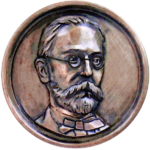W opracowaniu
Aktualny numer
Numery specjalne
Archiwum
O czasopiśmie
Redakcja
Rada Redakcyjna
Recenzenci
Instrukcja redakcyjna
Zasady etyki publikacyjnej
Zasady recenzowania
Ghostwriting
Prawa autorskie i polityka Open Access
Klauzula informacyjna RODO – dla autorów artykułów zgłoszonych do publikacji w kwartalniku „Komunikaty Mazursko-Warmińskie”
Kontakt
Cennik
PROJEKTY
Chrystian – biskup Prus i jego dzieło
w kontekście cysterskiej misji
chrystianizacyjnej
1
Ośrodek Badań Naukowych im. Wojciecha Kętrzyńskiego w Olsztynie
Data publikacji online: 23-11-2016
Data publikacji: 23-11-2016
KMW 2016;293(3):485-497
SŁOWA KLUCZOWE
DZIEDZINY
STRESZCZENIE
This article describes the role of Bishop Christian in the evangelization of the Prussians. Christian
– a Cistercian monk continued his mission of converting Prussia to Christianity from Pomezania, Warmia and
Lubawa, which began in 1207. Christian as Bishop of Prussia in agreement with the Pomeranian princes and
Danish king Valdemar II pursued the policy of a peaceful mission, and it is also possible that he tried to subjugate
the lands where he succeeded to the Holy See. Proof of the tribute paid to the Pope by the Prussian lands - terra
Lubavia and terra Lansania, is provided by two bulls of 1216, in which the representatives of these lands after
a prior agreement give themselves over to the care of the papacy. After 1216 the situation became increasingly
difficult. There was a retaliatory action against the pagan regions of Prussia. Christian tried to organize with the
Pope a crusade against the Prussians. Despite several military expeditions, they did not achieve much success.
It was only after the arrival of the Teutonic Order who used Christian’s abduction and imprisonment by Prussian
Sambians that the lands of the pagans were successfully conquered. After being freed, Christian tried to oppose
the actions of the knights of the Teutonic Order, siding with the duke of Pomerania Swietopełk who was fighting
against them and supporting the Prussian uprising of 1242–1249.
CYTOWANIA (1):
1.
The impact of the crusade ideas in Western Pomerania (from the twelfth to the first quarter of the thirteenth century )
Kamil Wasilkiewicz
Slavia Antiqua. Rocznik poświęcony starożytnościom słowiańskim
Kamil Wasilkiewicz
Slavia Antiqua. Rocznik poświęcony starożytnościom słowiańskim
Udostępnij
ARTYKUŁ POWIĄZANY
Przetwarzamy dane osobowe zbierane podczas odwiedzania serwisu. Realizacja funkcji pozyskiwania informacji o użytkownikach i ich zachowaniu odbywa się poprzez dobrowolnie wprowadzone w formularzach informacje oraz zapisywanie w urządzeniach końcowych plików cookies (tzw. ciasteczka). Dane, w tym pliki cookies, wykorzystywane są w celu realizacji usług, zapewnienia wygodnego korzystania ze strony oraz w celu monitorowania ruchu zgodnie z Polityką prywatności. Dane są także zbierane i przetwarzane przez narzędzie Google Analytics (więcej).
Możesz zmienić ustawienia cookies w swojej przeglądarce. Ograniczenie stosowania plików cookies w konfiguracji przeglądarki może wpłynąć na niektóre funkcjonalności dostępne na stronie.
Możesz zmienić ustawienia cookies w swojej przeglądarce. Ograniczenie stosowania plików cookies w konfiguracji przeglądarki może wpłynąć na niektóre funkcjonalności dostępne na stronie.




